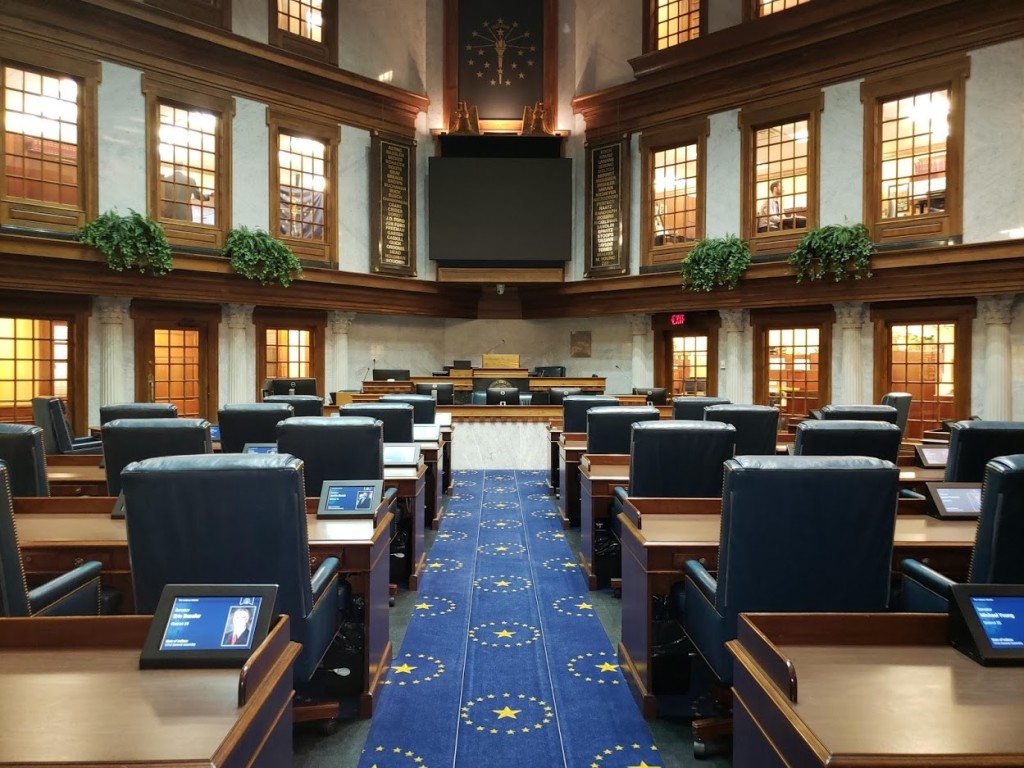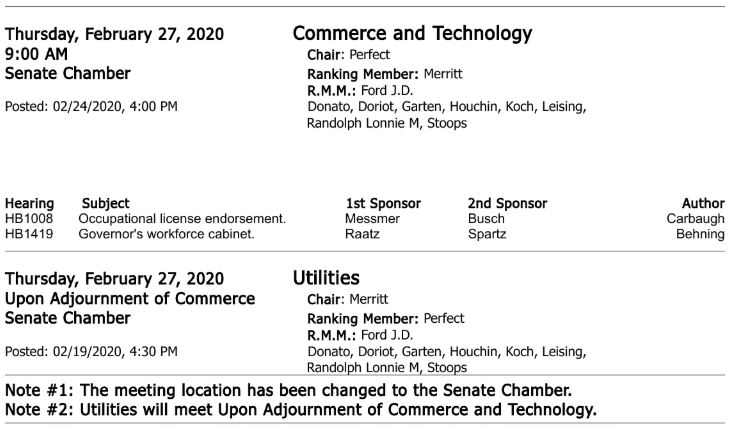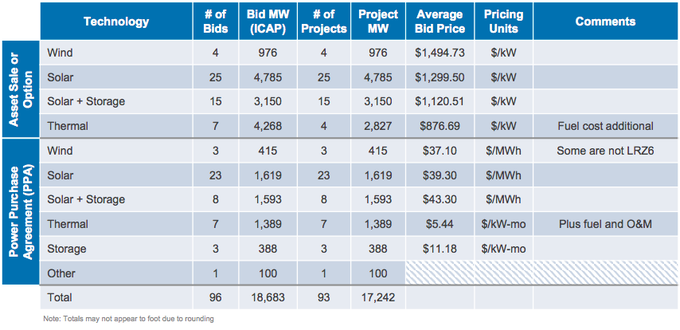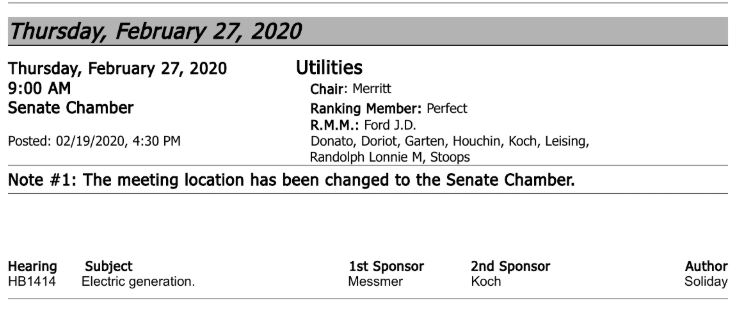'Nobody's really for this bill, so why does it keep moving?': Indiana coal bill hits state Senate today
House Bill 1414 has drawn a diverse coalition of business and energy stakeholder opposition. After passing the House earlier this month, it's headed to the Senate today.

IndianaDG Note: HB 1414 received a DO PASS as amended by a vote of 8-2 on 2/27/2020 from the Senate Utilities Committee. Amendments #8 and #6 were added to the bill.`
Published Feb. 27, 2020
he Indiana Senate on Thursday is poised to hear testimony on a bill that would add regulatory layers to the coal plant retirement process, among other things, as a broad range of stakeholders continue to question why the bill exists in the first place.
"That's the million dollar question we're all trying to figure out. Nobody's really for this bill, so why does it keep moving?" Greg Ellis, vice president of energy and environmental policy at the Indiana Chamber of Commerce told Utility Dive.
House Bill 1414 passed the General Assembly earlier this month despite diverse opposition from utility interests, consumer advocates, environmentalists, clean energy advocates and business groups in the state.
"We need the bill because, at the rate coal mines are closing and the warm winter, we need to get them through until we can deal with the bigger issue [of plant retirements] in a longer form."
Edmond Soliday, Republican Indiana Representative
The legislation was introduced in January, almost a year ahead of an anticipated December 2020 recommendation from the state's energy task force on how Indiana should shape its energy future. It began with just one sponsor — Rep. Edmond Soliday, R, who also chairs the task force.
Rep. Soliday has not responded to multiple Utility Dive requests for comment since January, but in hearings has defended the bill as a way to slow the state's shift away from coal and maintain a reliable power mix.
"We need the bill because, at the rate coal mines are closing and the warm winter, we need to get them through until we can deal with the bigger issue [of plant retirements] in a longer form," he said during a Jan. 15 Utilities, Energy and Telecommunications Committee meeting on the bill.
Since then, the bill has gone through several changes, but concerns over its larger message remain. Coal interests support the bill for slowing down what they say is a plant retirement process that needs more oversight and scrutiny for ratepayers and grid stability.
Environmentalists and clean energy interests have called it a "trojan horse," dressed down in the House to include a Sunset Clause of May 2021 that some fear will disappear in the Senate, cementing the legislation into state policy for the foreseeable future. Others say the bill is evidence of a legislative direction favorable to coal and deaf to the long-term needs of a rapidly transitioning energy landscape and the growing threat of climate change.
HB 1414 as it stands
HB 1414's top-line purpose is to give the Indiana Utility Regulatory Commission (IURC) greater oversight on coal plant retirements. Utilities in the state have been increasingly moving away from coal and toward cheaper renewable energy and natural gas.
Coal-fired electricity generation has fallen 30% in Indiana in the past decade, according to the U.S. Energy Information Association, though the state is one of the top 10 producers of coal in the country. And the fuel is undoubtedly a major player in the state's economy, providing jobs and tax benefits, as Indiana Coal Council President Bruce Stevens testified when the bill was introduced.
The current bill would prohibit utilities from retiring plants without giving the IURC at least three years notice, which some say adds a layer of unnecessary bureaucracy, but others note is important to ensure utilities are making decisions that are prudent and will protect the state's power supply.
"Indiana is the number one manufacturing state in the country … and so it's important that we have the baseload to be able to sustain that so we can do business," Rep. Alan Morrison, R, who cosponsored the bill, told Utility Dive after it passed the House.
Critics of the additional IURC oversight note that Indiana already has a comprehensive energy planning process that involves years of planning and stakeholder oversight. And utilities in the state have maintained that their decisions to retire coal are rooted in sound economics with reliability in mind.
"It's pretty clear that the bill is just catering to a special interest and it's trying to bail out the coal industry, that's having difficult times and it's going to be done at the expense of Indiana ratepayers."
Matt Pierce, Democratic Indiana Representative
"These decisions [to close coal-fired plants] are not made lightly. We know plant retirements have an impact on the communities where they operate, on our employees, and the state as a whole," Mike Hooper, senior vice president of regulatory policy, legislative affairs, and strategy for the Northern Indiana Public Service Company said in testimony last year before the House Utilities Committee, when discussions on the task force's goals were still ongoing.
"Energy companies are generally risk-averse businesses. Such changes are very calculated and measured in nature. The IRP process we follow allows for flexibility and optionality, and we have the opportunity to reassess every three years and adjust if necessary," he said.
Utilites in the state referred Utility Dive to the Indiana Energy Association for comment. IEA initially opposed the bill, but after amendments were made earlier this month, said it was still determining impacts to its members. President Danielle McGrath did not respond to Utility Dive's requests for comment this week about its stance ahead of the committee hearing.
One House amendment that sparked a lot of attention would allow utilities to recover costs for up to 90 days of fuel supply reserve for their operating coal plants.
Coal fuel shortages have not been an issue for Indiana utilities — in fact the opposite is true. Duke Energy Indiana is already contractually oversupplied for coal by 120% through 2020, according to Jan. 6 testimony from Duke Energy Progress Managing Director of Fuel Procurement Brett Phipps. But bankruptcies are piling up for coal companies, and some say this is the bill's real purpose, to bail out those companies.
"It's pretty clear that the bill is just catering to a special interest and it's trying to bail out the coal industry, that's having difficult times and it's going to be done at the expense of Indiana ratepayers," Rep. Matt Pierce, D, who voted against the bill, told Utility Dive.
The Indiana Coal Council has not responded to multiple requests for comment.
Indiana's energy battle
Indiana established its "21st Century Energy Taskforce" in 2019, borne out of a failed bill, also introduced by Soliday, that would have placed a moratorium on building new power plants in the state. The group held four formal meetings last fall that brought in experts from across the power sector to testify.
"There's two things at play in Indiana that … it looks like the task force has taken seriously based on the nature of who they've invited and how they're talking about it in the Q&A," Michael Nasi, a partner at Jackson Walker LLP in Austin, Texas, who testified in front of the task force during its Oct. 31 meeting, told Utility Dive.
From his perspective, the two greatest threats to the state are the dynamics of a regulated market, and how that may allow outsized subsidies to renewables, and the potential costs of integrating high levels of renewable energy onto the system.
"The question I think the task force should get its hands around is 'Will the nature of the wind resource and/or solar resource that Indiana can attract to the market ... be sufficient to perform at a level that will not impose costs on the system?" he said. Of particular concern should be whether utilities are making new investments for the right reasons, particularly considering how much ratepayer money has already been spent to retrofit coal plants, he said.
Certainly, as the grid shifts toward more renewable resources, the way it's operated and regulated will need to change, Matt Brinkman, regional practice manager of energy at Burns and McDonnell, who also testified before the task force, told Utility Dive.
"If we want to discuss global warming, I think that's another committee."
Edmond Soliday, Republican Indiana Representative
But "it's clear that the nation, through policy, through reducing costs is going more renewable. So ... you've got a choice. You either get behind it and support it or you try to hang onto what we have," he said. And hanging on to to the status quo could potentially put regulations, policy and the grid behind, as well as cost ratepayers more, as study after study continues to find customers save money through transitioning from coal, he said.
In other words, there are a myriad of issues a state like Indiana needs to be able to address in order to successfully transition toward clean energy, Laura Ann Arnold, president of the Indiana Distributed Energy Alliance, told Utility Dive. And Indiana is behind on some of those critical issues, including interconnection, transmission and net metering.
That points to another reason so many among the state's power and environmental groups are opposed to this bill — they fear it indicates a pro-coal direction for the state's task force and its broader energy policy moving forward. Of further concern is Chair Soliday's assertion that climate change discussions don't belong in the task force.
"If we want to discuss global warming, I think that's another committee," Soliday told Sen. Mark Stoops, D, after he asked about the cost of carbon and global warming during a meeting. "I mean, that's an impossible task because it becomes very political, very quickly," Soliday said.
HB 1414's Senate path
Many were surprised by HB 1414's narrow 52-41 passage through the House and say additions like the sunset clause were crucial to its success. Its path in the Senate is less certain, several amendments have been proposed, but it may face additional hurdles in conference committee if it's dramatically changed.
"The only thing I'm pretty confident of is that the Democrats in the committee will vote against it," Sen. Lonnie Randolph, D, who serves on the Senate Utilities Committee, told Utility Dive.
Multiple Republican Senators were not able to respond to Utility Dive requests for comment by time of publication, but Democrats noted the bill was expected to have a long list of witnesses testifying in opposition, including the Indiana Chamber of Commerce, which might get some Republicans on the naysayer side.
"That in and of itself should be a signal to the members of the committee that it's not a very good deal" because of the many businesses across the state that are members of the chamber of commerce, said Randolph.
"What I think is going to happen is Soliday is going to put his foot down, not want to accept the changes. … Then it may be tainted enough by all the publicity that we can actually vote it down in total."
Mark Stoops, Democratic Indiana Senator
Additionally, heavy media coverage of the bill has made senators more aware of the implications behind it, Stoops told Utility Dive.
"I think now everyone understands ... why the push for this bill, and who's backing it and why," he said. "There are legislators who understand that it really makes not just good environmental sense, but actually good financial sense to move to renewables."
Killing the bill altogether may be difficult in a Republican-majority Senate since it passed the Republican-majority House, despite the strong base of opposition, he said. But there are already ten proposed amendments in front of Utilities Committee Chair Jim Merritt, R, including one that would eliminate the 90 day fuel clause and another that would shorten the sunset clause to six months.
"I don't see that there is a will on the Republican side to actually kill it, so I'm hoping we fix it," said Stoops. One portion of the bill that seems to have bipartisan support is a clause that sets more state funding aside for displaced workers, though it doesn't provide additional money from the state.
Once the Senate approves any amendments to the bill, it would need to go through a Senate-Assembly conference committee to hash out any differences and create a final bill to vote on.
"All kinds of strange things can happen in conference committee. They could completely strip it and then put in new language altogether," said Stoops.
"What I think is going to happen is Soliday is going to put his foot down, not want to accept the changes. … Then it may be tainted enough by all the publicity that we can actually vote it down in total."
Follow Catherine Morehouse on Twitter









